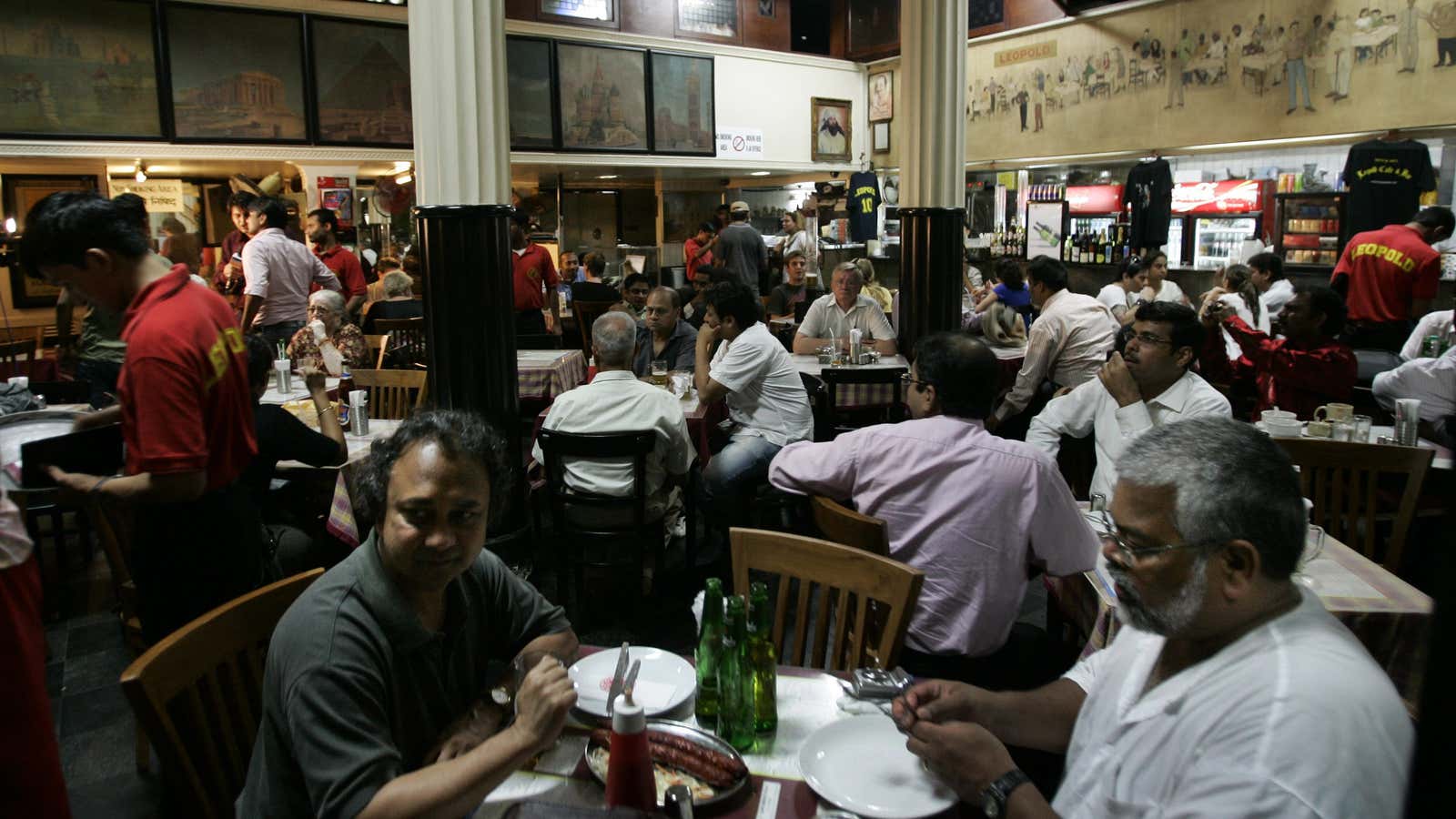Indian restaurants have come out all guns blazing against food-delivery players.
For a while now, hospitality industry trade bodies have been calling out food-service aggregators (FSA) such as Zomato, Swiggy, Nearbuy, Dineout, EazyDiner, and Magicpin for their unethical business practices.
On Aug. 18, the Federation of Hotel & Restaurant Associations of India (FHRAI) got behind the #LogOut movement spurred by the National Restaurant Association of India (NRAI), a grouping of over 500,000 eateries.
“Over the past two days, NRAI has held extensive meetings with all restaurant aggregators and we were bemused to learn that the aggregators were promoting deep discounts to stay competitive amongst each other. While one aggregator gave 1+1, the other had to adopt a 50% discount scheme in order to stay relevant,” NRAI president Rahul Singh said in a press release on Aug. 20.
“And what hurts the most is that these deep discounts are funded by the restaurant industry and not the aggregators, (and) restaurants do not get any share of the proceeds that aggregators generate from guests as subscription fees,” Singh added.
For outlets already grappling with high overheads and operating costs, not jumping on the discounting bandwagon is a kill switch. “If a restaurant withdraws from discounting, the FSAs app immediately downgrades it and favours another restaurant which may still be in a position to discount,” said Pradeep Shetty, joint secretary of FHRAI. “This is just not fair.”
Tissues for these issues?
Discounting may perhaps be the biggest problem, but it’s not the only one.
The FHRAI has also taken issues over restaurant aggregators pocketing unreasonably high commissions of around 25%. Last year, when Kerala’s restaurant industry was protesting against high commissions, restaurant owners told Quartz that Zomato and Swiggy were charging upwards of 30% commission, and their businesses would only be lucrative if the number came down to 10%.
Add to that the rampant miscommunication and a lack of transparency. The contracts between restaurants and FSAs are often one-sided and inconsistent, and they are “frequently and unilaterally changed from time to time and always in favour of the FSAs,” alleged Gurbaxish Singh Kohli, vice-president of FHRAI.
In some instances, delivery firms even mislead customers by showing a restaurant as closed when their delivery boys are unavailable, added DVS Somaraju, honorary treasurer of FHRAI.
Another smokescreen is number masking, wherein a customer’s number is not revealed. Though it is done for privacy and security reasons, restaurants believe it disconnects them from the customer base.
Zomato, Swiggy, and EazyDiner did not respond to Quartz’s request for comment.
Rotten egg?
Zomato has faced the biggest wrath so far.
Over 2,000 of the 6,500 partners of its paid subscription programme Zomato Gold have withdrawn. This plan gives customers unlimited, exclusive deals on food and drinks at over 1,200 restaurants, bars, and pubs for Rs1,000 ($14) annually.
Among those who chose to #logout were Olive group owner AD Singh and Riyaaz Amlani, CEO of Impresario Group, which runs outlets such as Social, Slink and Bardot, Smokehouse Deli, and Salt Water Cafe.
The uproar came days after Zomato launched another cost-saving membership scheme called Infinity Dining in late July. It gave people the option of ordering unlimited food and drinks at a slew of restaurants for a fixed price.
Initially, Gold was launched with “an assurance that only a handful restaurants in each area would be enlisted,” said SK Jaiswal, vice-president of FHRAI. “But later Zomato approached every outlet to participate, which amounts to cheating our members who have no recourse considering all the above stated positions.”
Other aggregators such as Dineout believe they are relatively unscathed since their model is already one of “sustainable discounting.”
“We allow the restaurants to select the discounts they want, based on the day of the week and time of the day—completely customisable offers for the restaurants,” Ankit Mehrotra, co-founder and CEO of the Noida-based company, told Quartz. “Moreover, our premium product Gourmet Passport acts a discovery platform for premium restaurants and allows only three redemptions per restaurants in the entire year versus other platforms offering 1+1 every day, 365 days of the year.”
Magicpin CEO and co-founder Anshoo Sharma told Quartz he fully supports of NRAI’s cause, adding that the company works with a base margin of 10% and partners can top-up as per their marketing needs.
New recipe, same ingredients?
Zomato founder and CEO Deepinder Goyal has since recognised that the “bargain hunters” are gaming the system and has agreed to revise the Gold programme.
“The biggest pain point we heard was that users hop between places on a busy evening, claiming 1+1 starters at one place, 1+1 main course at another, and 2+2 drinks at some other,” Goyal wrote in a letter to restaurant partners.”
To counter this, Zomato will restrict Gold membership to one unlock per day. It has also capped the number of Gold unlocks per table at two. The company is also providing users login IDs to be used only on a single mobile device at a time, so login sharing becomes impossible. The changes will be rolled out by Sept. 15.
Additionally, to ease the burden on restaurants, Goyal also announced ad credit for high performers, shooting videos for smaller business at no cost, and personalised push notifications at restaurants to drive business even on non-peak days.
Still, the restaurants are not laying down their weapons.
Rahul Singh, president of NRAI dismissed the letter as a “knee-jerk reaction” and claimed that the Gold revision was merely an attempt “to stuff old wine in a new bottle.”
“Since the launch in November 2017, this programme has been shifting goalposts,” said Singh. “We stand united in the cause to obliviate the deep discounting phenomenon, and will therefore #stayloggedout.“
What’s more, in appeasing restaurants, Zomato may have dug itself into a bigger hole with its million-plus Gold subscriber base. On top of restricting the use, Goyal also promised not to sell the membership for under Rs1,800 ($25).
Now, this has not gone done well with users.
